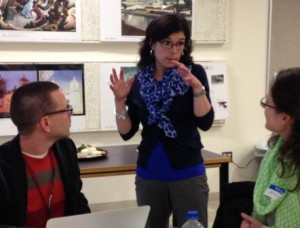Faces of ALBA-VALB: Kelley Brown
Master Teacher Kelley Brown speaks about her experience teaching with ALBA’s materials in Massachusetts.

Faces of ALBA-VALB
Kelley Brown at ALBA’s Institute in Newton, Massachusetts, April 2015. Photo Rich Cairn
Few people in Western Massachusetts are busier than Kelley Brown. A full-time History and Social Studies teacher at Easthampton High, she also heads up her department and coordinates professional development activities at her school. On top of that, for the past nine years she has served as a master teacher in dozens of workshops on topics ranging from incarcerated youth in Massachusetts to Teaching American History. She has taught an ALBA institute twice.
You’ve been in the classroom for 15 years. How has the field changed since you started?
For the past 10 years, many of us have been pushing to move away from a model of history and social studies teaching that focuses on students learning information—which they memorize and quickly forget—to one that teaches students to think like historians: to ask the kinds of questions that historians ask, and to answer those questions by analyzing and evaluating sources. This means we are focusing much more on skills than we used to. It also means we are trying to strengthen the connection with academic historians, for example by bringing them into the classroom.
We have been pushing for students to think like historians.
How have the different waves of state and federal standards helped or thwarted this change in focus?
Recent shifts in standards have some positive aspects, but they also have some real negative effects on the way that we teach social studies. The Common Core State Standards that Massachusetts and many other states have adopted do incorporate reading and writing skills that align with some of the disciplinary skills we are working on. The problem is that the Common Core standards are based in English Language Arts and Math, while the skills for social studies and other subjects are relegated to an addendum. Being able to read and write is obviously very important in all those fields, but history and civics are pushed to the side. This is problematic. Social studies are a core discipline. If we are not training young people to become good citizens, and to at least know the structure of their own government, we can’t have a participatory democracy. That is bad news for the United States and, given our country’s global importance, it’s bad news for the rest of the world.
If we are not training young people to become good citizens, we can’t have a participatory democracy.
This deeper trend in standards is disconcerting to me. If schools are only going to be held accountable for English and Math, that’s where they will put their resources. Right now, if middle schools have to make cuts, they are cutting social studies teachers and distributing the subject among teachers in other departments. Why? Because social studies is not tested. In elementary schools, too, there is less and less time to spend on social studies and history.
The more you move decisions away from state and local communities, the more you sacrifice quality for uniformity. The people most directly affected—the teachers, the parents—lose their voice. They lose their ability to advocate for what they think is best for the students they are working with and the communities they are working in. Participation in government is important—and schools are the one place in which we all have experience. People want to be part of a decision process. But the trend in nationwide standards disempowers them. If people do not believe they can affect change, they disengage and that is bad for all of us.
How do you see the ALBA workshops?
The ALBA workshops provide exactly what busy teachers need. There are three things I like in particular. First, the ALBA approach allows teachers to learn in depth about an area they are unfamiliar with. There is a definite dearth of knowledge about the Spanish Civil War among social studies teachers. Second, ALBA has a wonderful set of resources that are accessible and interesting, and directly transferrable to the classroom. The set of letters, for example, are incredibly useful because they are short, they are readable for any student, and they create a great hook. The same is true for the images, especially the posters. Third, ALBA has teachers who have actually used the resources, show how they have done that, and work with their colleagues to develop lesson plans that they can apply immediately.
The ALBA workshops provide exactly what busy teachers need.
Teachers are very excited about shifting from pure content coverage to more disciplinary work. But that doesn’t mean they are necessarily good at it yet. The ALBA workshops help them see that they can in fact do it. Teachers’ first reaction often is: I would like to do this, but I cannot fit anything else in. We tell them this is not about fitting yet another thing in, but about integrating skills into the learning of history. And to that the ALBA resources lend themselves very easily.
Tell me about your own experience using the ALBA materials in the classroom.
As a preparation to teach World War II, we spend some time looking at two of the ALBA letters, from Canute Frankson and Hyman Katz, and practice historical thinking skills. We start with a brainstorm around an historical question: Why are people willing to risk their lives to help other people, particularly in a situation that doesn’t directly affect them? High school students like to think about ideas like this. The letters make that question come alive. They are very accessible and hook students into the lesson—but they also have good evidence to help students answer our question. From there, we move into skills: identifying and organizing evidence, and of course writing.
Sebastiaan Faber teaches at Oberlin College and helps coordinate ALBA’s Teacher Institutes.












